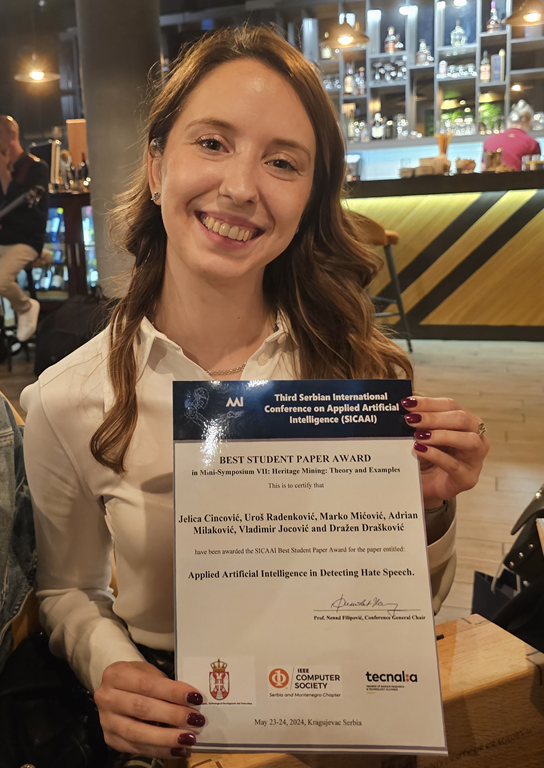
History of the first Data processing laboratory
The beginning of digital computing in Serbia (and Yugoslavia) was marked by the development of the CER-10 (Digital Electronic Computer), realized according to the conceptual design of professor Tihomir Aleksić and academician Rajko Tomović, together with a group of engineers from the "Mihajlo Pupin" Institute and the "Vinča" Institute. It was a computer with memory with ferrite cores with a capacity of 2 x 12 kilobytes, supported 24 basic instructions, and could perform 50 thousand operations per second.
Professor Aleksić founded the Department of Data Processing at the School of Electrical Engineering (ETF) in 1971 with the laboratory of the same name. Along with Professor Aleksić, the permanently employed members of the laboratory were Jozo Dujmović, Borivoj Lazić, and Dušan Velašević. They later traced the development path of the computing profession at the ETF and became its doyens. At that time, the first digital computer, IBM 1130, purchased in 1968, was working at the university. It had a memory size of 16 K memory words (32 KB) and a removable disk of 1 MB, and it performed a floating-point addition operation in 460 microseconds. This computer was upgraded in 1972 with an additional 32 KB of memory and an additional 1 MB disk, which was used until 1985.
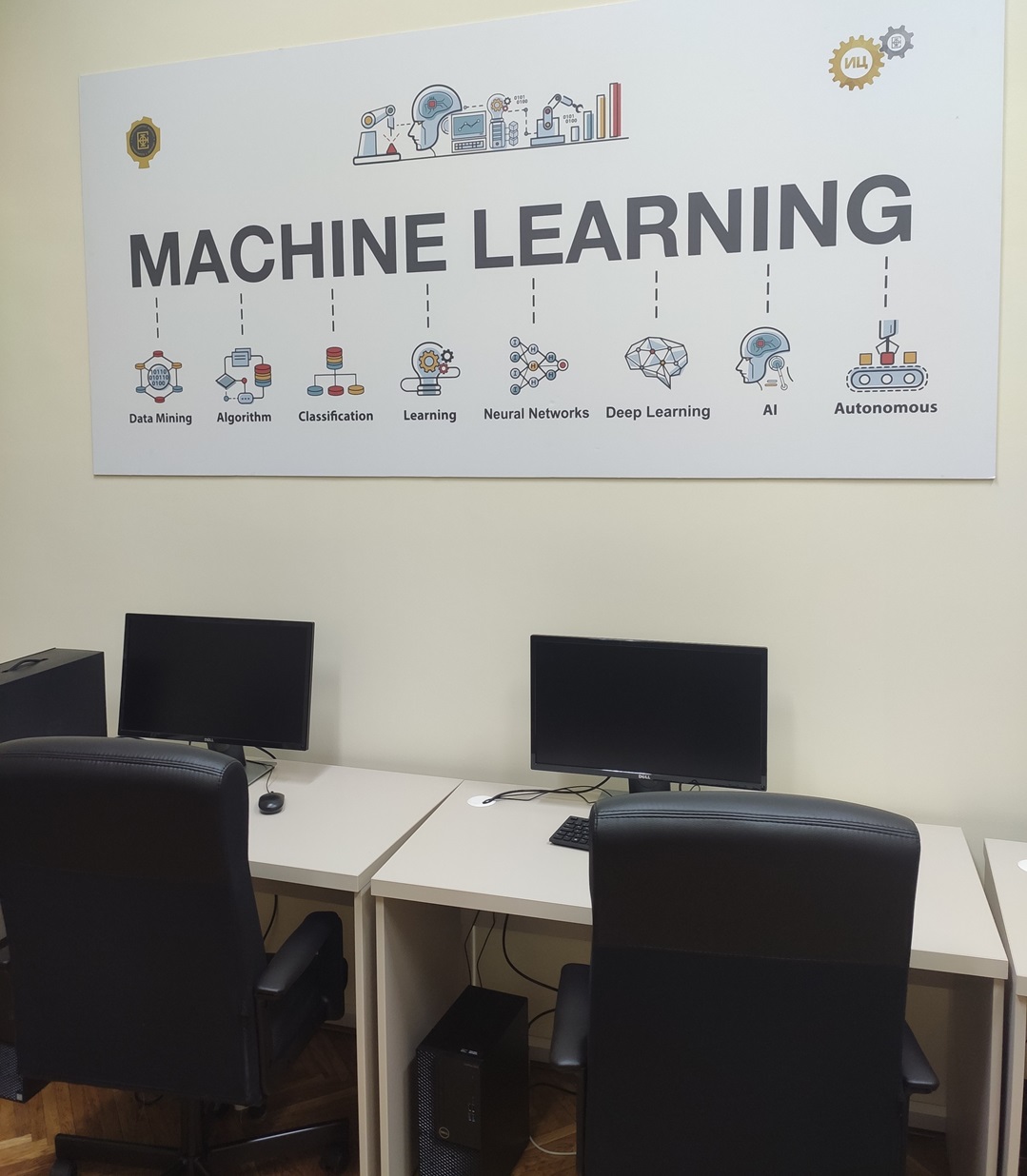
New beginnings of the laboratory
The increasing popularity of computing resulted in introducing a new study program (department) in Software Engineering (SE) at the ETF in 2004 and the reform of the existing basic and master academic studies in Computer Engineering (CE) in 2003. New courses were introduced in the field of AI, Intelligent Systems (prof. Dr. Boško Nikolić and assistant Dražen Drašković), and Data Mining (prof. Dr. Veljko Milutinović and assistant Bojan Furlan). Later, the courses Natural Language Processing (Prof. Boško Nikolić, Ph.D. and assistant Vuk Batanović) in the Master's program and Advanced Machine Learning Algorithms (Prof. Dražen Drašković) in the PhD program were added to the curricula of computer science majors.
In the premises of the Computer Center ETF, whose manager is Prof. Dr. Boško Nikolić, the research group he leads got premises in 2016, with a modest infrastructure of a few computers with stronger CPUs and GPUs, as well as a larger number of servers. In the AI field, the first R&D projects that apply machine learning and deep learning, natural language processing, and data processing are being implemented, and the first researchers are working on their doctoral theses (all under the mentorship of Prof. Boško Nikolić):
- Dražen Drašković, the first PhD in the Application of Artificial Intelligence in Software Engineering (2018) - topic: "Software System for Learning and Application of Artificial Intelligence Algorithms" (supervised by B.Nikolić, M.Cvetanović)
- Vuk Batanović, the first PhD in the Natural Language Processing (2020) - topic: "A Methodology for Solving Semantic Tasks in the Processing of Short Texts" (supervised by B.Nikolić, M.Cvetanović)
- Vladimir Jocović, the first PhD in the Deep Learning for Computer Vision (2023) - topic: "Automated Assessment of Pen and Paper Tests using Artificial Intelligence" (supervised by B.Nikolić, S.Stojanović)

Research work
The activities of the laboratory for data analysis and the application of artificial intelligence combine basic research into the development of new software systems based on machine and deep learning models, research in the field of natural language processing, the application of computer vision in solving various problems, then experiments using data exploration, data analysis and visualization in the fields of education, medicine, transport, and other fields of industry.
- Our last core research projects deal with:
- Big data analysis: project "The European federation of Data Driven Innovation Hubs", 2021-2024, funded by Horizon 2020 program
- Machine learning and Deep learning: project "Modeling errors in DNA storage using machine learning techniques (MEDSMALT)", 2021-2023, funded by Science Fund of the Republic of Serbia
- Natural language processing in Software Engineering: projects "Advancing Novel Textual Similarity-based Solutions in Software Development", 2020-2022, and "Software for Text Offences Prevention in Serbian: Al-driven Hate Speech Detection", 2024-2025, both funded by Science Fund of the Republic of Serbia
- Data mining and Information retrieval: project "Intelligent information retrieval based on ontologies", 2012-2013, funded by Ministry of Science of the Republic of Serbia and Ministry of Science of the Republic of Slovenia
(*For more details, see the web page - Projects)


Infrastructure and equipment availability
Our laboratory within the Computing Centre of the ETF currently possess 5 cards in 4 servers with 11712 CUDA cores (3 x 2880 + 1 x 3072) and 8192 AMD cores. The center has an infrastructure of over 75 servers with a capacity of 220TB of space. A small space in the cloud has been raised for all employees at the ETF, with the option to be an open cloud space. Cloud currently has 80TB of space. Our laboratory has the ability to virtualize servers and deploy many modern services for server and cloud infrastructures. Regarding computing power and storage capacity, our performance is 4-11 Tflops (per AI node, depending on the platform).
The ETF cloud is available to all our employees - teachers and researchers. The space within the cloud is upgraded and expanded every year, as the number of research projects and cooperation projects with industry is increasing. The space can be accessed through any location on the Internet. Servers with GPU cores are accessed via a VPN connection. There is a very good degree of infrastructure customization (Containerization, Virtualization, different variants of DB infrastructure - relational and non-relational, etc.), and the administration team is ready to meet all the requirements.
Resources are allocated according to the agreement and are often transferred from other faculties (the University of Belgrade has over 10 thousand employed teachers and researchers in the staff). In this way, multidisciplinary research is included. Priority in resource allocation is given to young research teams in doctoral studies, European (Horizon 2020/Horizon Europe, Interreg, EUREKA projects) and national projects - Application of Artificial Intelligence, Core Research projects and Technological development projects. For projects with industry or other interdisciplinary projects in the country and the region, resources in the form of equipment are usually provided by the economic entities participating in the projects themselves, but resources are also allocated by the ETF.
The ETF is located as one of the main nodes in the national academic network - AMRES, which is also our institutional partner and will be involved indirectly as a partner in the data driven network as well.
- Capital equipment and specific resources:
- Atlas 200 AI Accelerator Module (Model: 3000)
- Atlas 500 Pro AI Edge Server (Model: 3000)
- NVidia TESLA and NVidia GeForce RTX 3080 Ti GPU

Standards and certificates
The ETF (School of Electrical Engineering) has an internal document on information storage and data security. Also, all working methods are described in the faculty process book and used for all internal processes from March 2021.
- Since June 2018, the ETF has been the owner of certificates for the application of standards that recognize the previous activities of the School, but also achieved a framework for even more intensive activities of the School in providing teaching, research and engineering services:
- ISO 9001 - quality management standard
- ISO 14001 - environmental protection standard
- OHSAS 18001 - occupational health and safety management standard
- ISO 27001 - information security management standard
- ISO 20000-1 - standard of services in the field of information technologies
It should be noted that two members of our laboratory participated in the writing of the National Strategy for the Development of Artificial Intelligence (Belgrade, December 2019) and were involved in the formation of the Serbian National Institute for Artificial Intelligence (May 2021). Our members have taken an active part in other working bodies for writing the most important documents (S3 platform for Serbia for period 2020-2025, National Strategy for Scientific and Technological Development 2021-2025).
Researchers, the members of our laboratory, strive to continuously learn and improve their knowledge in this field, so some of them have certificates in the field of machine and deep learning:
- Dražen Drašković: NVIDIA DLI Certificate - Fundamentals of Deep Learning (issued March 2022)
- Dražen Drašković: NVIDIA DLI Certificate - Fundamentals of Deep Learning for Multi-GPUs (issued March 2022)
- Jelica Cincović: NVIDIA DLI Certificate - Fundamentals of Deep Learning (issued November 2023)
Vision, mission and why we are good partners
Open for collaboration
If you are a research institution from Europe interested in participating in joint European projects in various programs, or you are a company or organization that needs some of our services, write to us.
Contact our contact personOur awards and recognitions
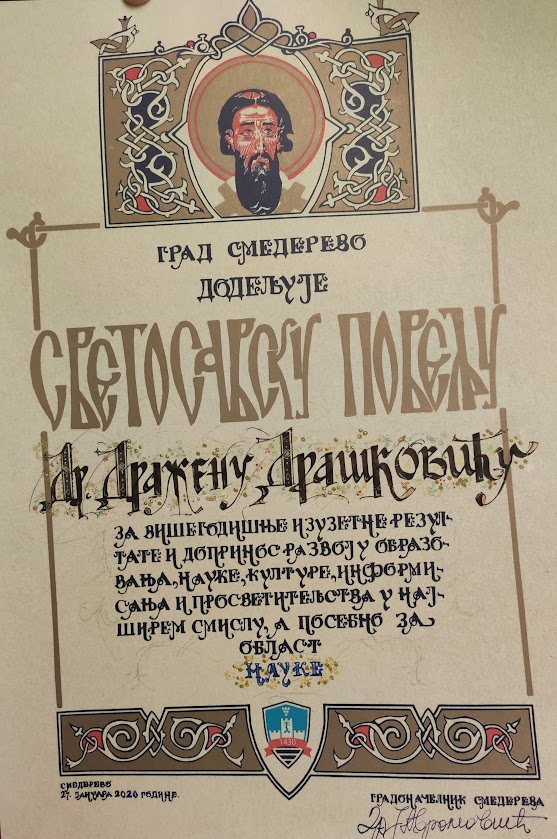
The Charter of Saint Sava for meritorious achievements in science and education
Dražen Drašković, January 2020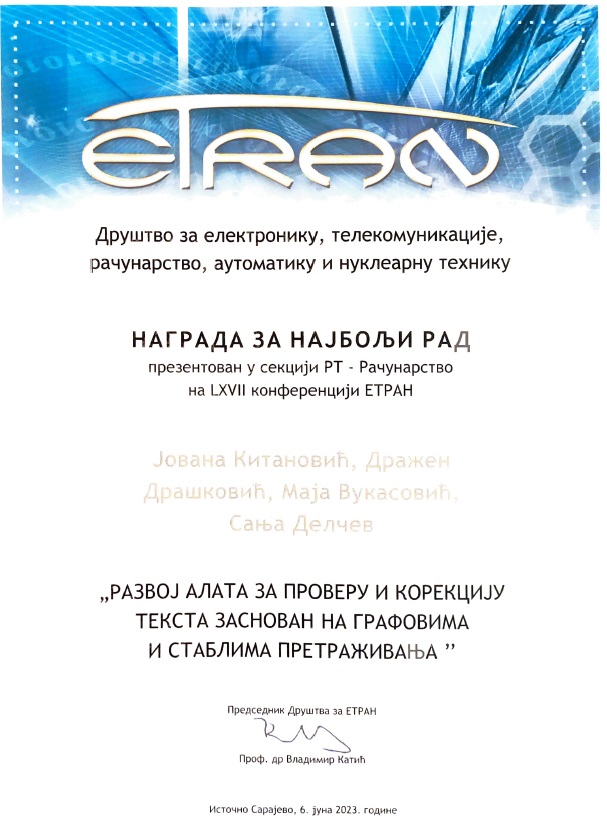
Award for the best paper of the 67th ETRAN conference in the Computer Science
June 2023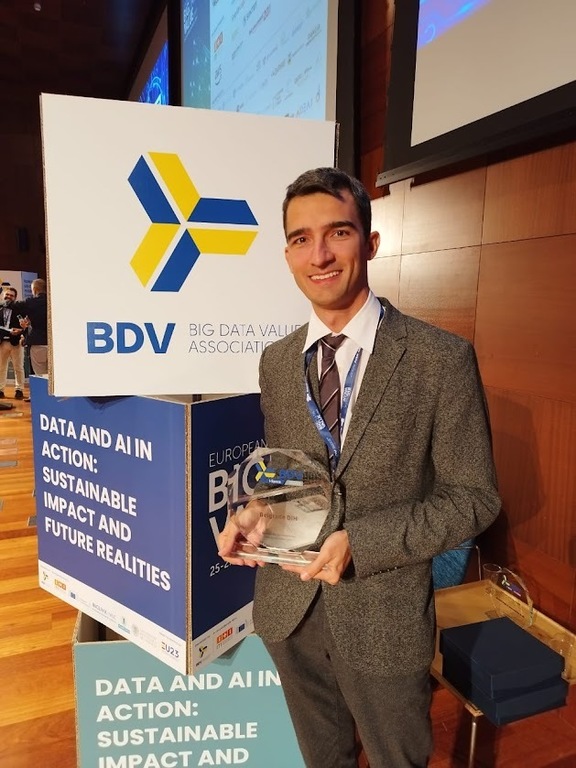
European Big Data Value Association Silver Plaque for 2023
November 2023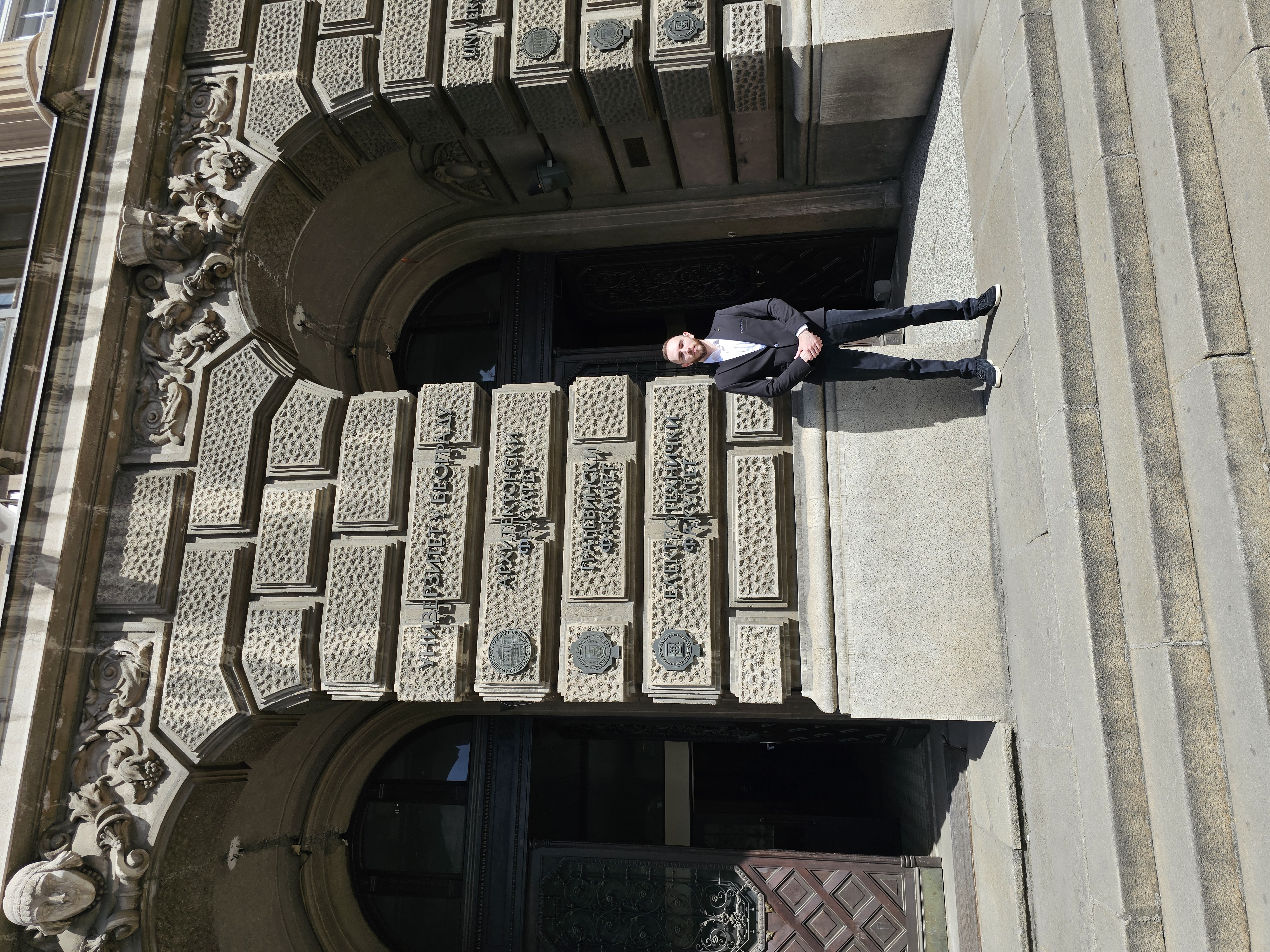
Award for the Best PhD in Computer Science
Vladimir Jocović, April 2024